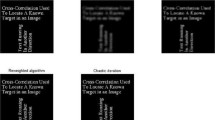Abstract
An efficient two-stage non-blind deblurring framework is proposed for recovering blurred images progressively. To this date, most approaches commonly solve a single variational regularization problem incorporated with chosen priors, limiting the attained restoration quality. To address this, two different priors are adopted in separated stages to restore an image in a coarse-to-fine manner and each stage follows a variational regularization scheme. In the first stage, salient edges and large scale textures are produced by minimizing the e 0 norm of gradient. The intermediate result is then refined by non-local auto regression model in the next stage. Finally, experimental results demonstrate that the proposed methodology is efficient and achieves nice performance.
Similar content being viewed by others
References
S. Cho and S. Lee, “Fast motion deblurring,” ACM Trans. Graph. 145 (8), 1–8 (2009).
L. Xu and J. Jia, “Two-phase kernel estimation for robust motion deblurring,” in Proc. ECCV 2010 (Heraklion, 2010), pp. 157–170.
R. Fergus, B. Singh, A. Hertzmann, S. T. Roweis, and W. T. Freeman, “Removing camera shake from a single photograph,” ACM Trans. Graph. 25 (3), 787–794 (2006).
K. Dabov, A. Foi, V. Katkovnik, and K. Egiazarian, “Image restoration by sparse 3D transform-domain collaborative filtering,” Proc. SPIE 6812 (07), 1–12 (2008).
D. Krishnan and R. Fergus, “Fast image deconvolution using hyper-Laplacian priors,” in Proc. Neural Information Processing Systems Conf. (Vancouver, 2009), pp. 1033–1041.
Y. Wang, J. Yang, W. Yin, and Y. Zhang, “A new alternating minimization algorithm for total variation image reconstruction,” SIAM J. Imaging Sci. 1 (3), 248–272 (2008).
L. Xu, C. Lu, Y. Xu, and J. Jia, “Image smoothing via L0 gradient minimization,” ACM Trans. Graph. 30 (6) (2011).
A. Buades, B. Coll, and J. M. Morel, “A review of image denoising algorithms, with a new one,” Multiscale Model. Simul. 4 (2), 490–430 (2005).
A. Levin, Y. Weiss, F. Duarand, and W. T. Freeman, “Understanding and evaluating blind deconvolution algorithms,” in Proc. CVPR (Miami, 2009), pp. 1964–1971.
Author information
Authors and Affiliations
Corresponding author
Additional information
The article is published in the original.
Kai Wang received the BSc degree in science of information and computation from Nanjing University of Science and Technology, Nanjing, Jiangsu, China, in 2010. He is currently pursuing his PhD degree in pattern recognition and intelligent system from Nanjing University of Science and Technology. His research interests are in mathematical image processing and the theory of image modeling. His current research is focused on high-quality image deblurring and video deblurring.
Liang Xiao received B.Sc., degree in Applied Mathematics and Ph.D. degree in Computer Science from Nanjing University of Science and Technology (NUST), Nanjing, Jiangsu, China, in 1999 and 2004, respectively. From 2006 to 2008, he was a Post-doctor Research Fel-low at the Pattern Recognition Laboratory of the NUST. From 2009–2010, he was a post-doctor at Rensselaer Polytechnic Institute (RPI), USA. He is currently an Associate Professor at the School of Computer Science of NUST. His main research areas include inverse problems in image processing, scientic computing, data mining, and pattern recognition.
Zhihui Wei received B.Sc., M.Sc., and Ph.D. degrees from South East University, Nanjing, Jiangsu, China, in 1983, 1986, and 2003, respectively. He is currently the professor and doctoral supervisor of Nanjing University of Science and Technology. His main research interests are mathematical image processing, image modeling, multiscale analysis, video and image coding and compressing, watermarking and steganography, and speech and audio processing. His current research is focused on the theory of image sampling, multiscale geometrical analysis, sparse representation, and partial differential equations.
Rights and permissions
About this article
Cite this article
Wang, K., Xiao, L. & Wei, Z. Two-stage image deblurring with L0 gradient minimization and non-local refinement. Pattern Recognit. Image Anal. 25, 588–592 (2015). https://doi.org/10.1134/S1054661815040082
Received:
Published:
Issue Date:
DOI: https://doi.org/10.1134/S1054661815040082




